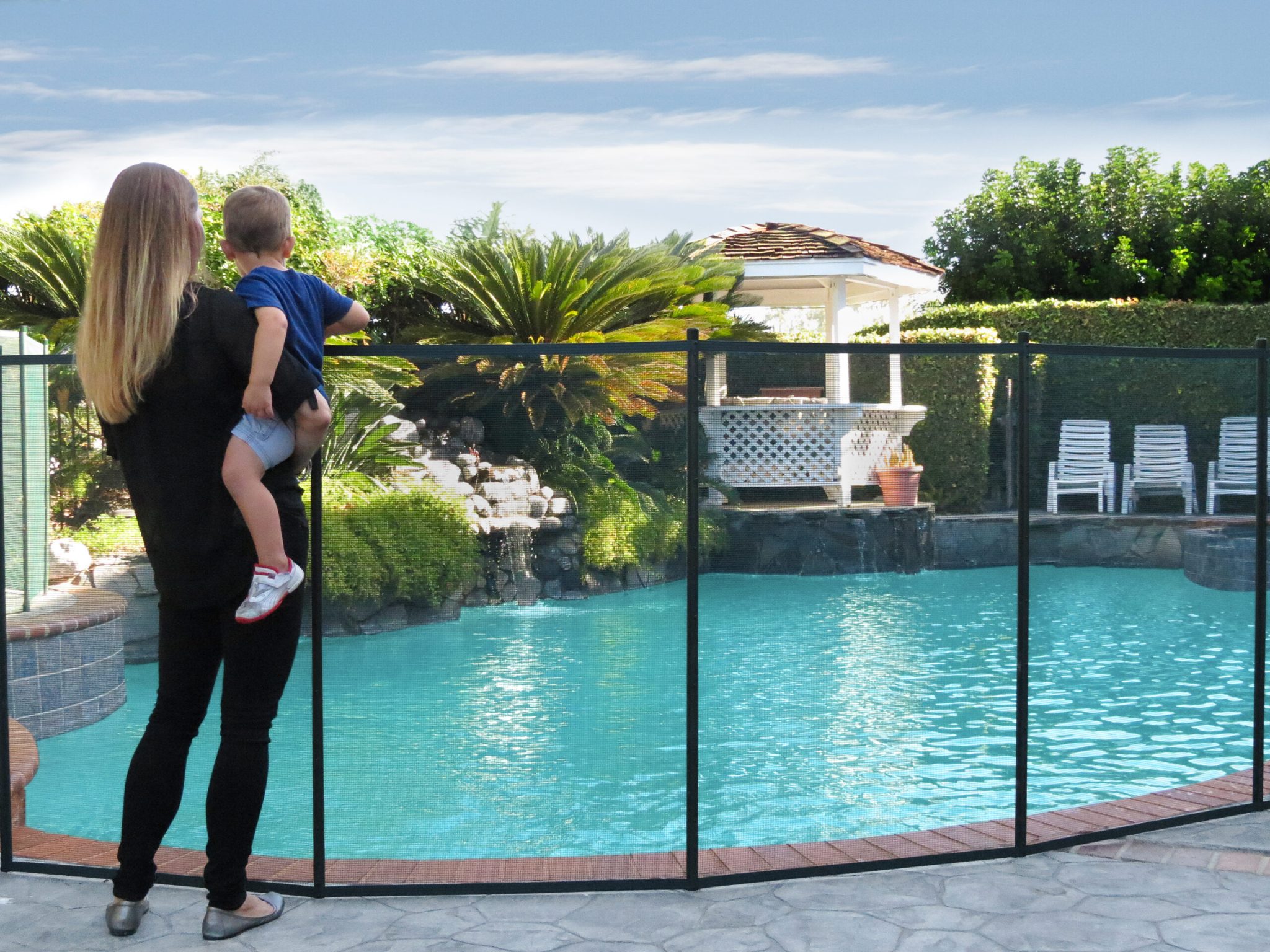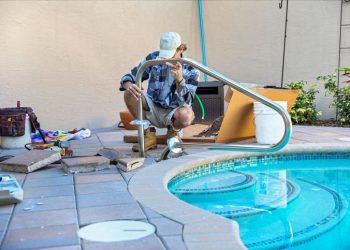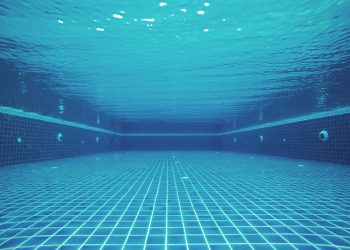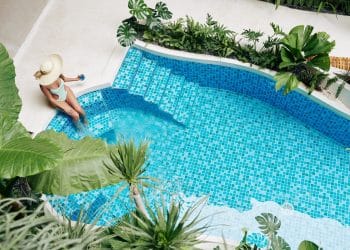Table of Contents
Rust stains in pool water have often been a source of concern and debate, especially among owners of saltwater systems. A prevailing myth suggests that saltwater systems might contribute to heightened corrosion issues. This guide seeks to dismantle such misconceptions and provides robust insights into maintaining pristine pools.
The science behind rust stains in pool water
Pool water rust stains, scientifically speaking, are a manifestation of oxidized iron. When metals containing iron come into contact with moisture and oxygen, oxidation occurs, leading to rust. Within the controlled environment of a pool, several factors can contribute to this phenomenon.
Saltwater pools, due to their salt system integral for salt chlorine generation, are sometimes mistakenly blamed. However, it isn’t the salt system directly causing the issue, but rather certain conditions, such as imbalanced water chemistry, that might amplify the oxidation process. This makes understanding and controlling these conditions pivotal.
Deciphering pool water stains and rust spots on the pool’s bottom
When there are rust stains in the pool water or rust spots on the pool’s bottom, it’s essential to differentiate between causes. While water chemistry plays a role, bottom stains often result from foreign metal objects, such as forgotten coins, hairpins, or even some children’s toys. Over time, submerged and unattended, these items oxidize, leading to rust stains in the pool water and distinct rust spots that can cause degradation.
To tackle this, it’s advisable to ensure regular cleaning and checks to remove any unintentional metal objects, thus preemptively addressing potential rust before it forms. Scheduled pool sweeps and manual checks can prove invaluable in this regard.
Saltwater pool corrosion: Disentangling fact and fiction
The dialogue surrounding saltwater pool corrosion problems largely stems from misconceptions that converting your pool to saltwater will cause additional corrosion when in most cases that simply isn’t the case.
At the heart of these misconceptions lies the intricate balance of pool water chemistry. For instance, pools that harbor a considerably imbalanced pH can indeed become more susceptible to corrosion. Yet, the myth needs busting: saltwater pools, when diligently maintained, are not inherent culprits of increased corrosion.
It’s also imperative to consider the quality of pool construction. High-quality pools, constructed with premium materials and craftsmanship, inherently exhibit resistance to saltwater pool corrosion. In contrast, pools not crafted for long-term resilience, such as some low-cost above-ground varieties, might be more vulnerable.
Strategies to combat rust and corrosion
Knowing how to get rid of rust in swimming pools and mitigate corrosion is essential for pool longevity. Here are some detailed strategies:
1. Ascorbic Acid Treatment: Ascorbic acid, or vitamin C, is a potent rust remover for swimming pools. When introduced into the pool in adequate quantities, it can neutralize and lift pool water rust stains, rendering the pool surfaces clean.
2. Pool Draining: For severe cases, draining the pool provides an opportunity for a comprehensive cleanup. This method not only offers direct access to rust stains and spots but also facilitates a more thorough rebalancing of water chemistry.
3. Acid Wash: Targeting stubborn stains requires an aggressive approach. Acid wash breaks down and lifts heavy staining but must be executed with caution due to its abrasive nature.
4. Specialized Stain Removers: Numerous products have been crafted specifically to address rust stains in swimming pool water. Depending on their formulation, they can be incorporated directly into the water or applied as spot treatments.
Pool water rust stains and saltwater pool corrosion: Common questions
FAQ 1: Does chlorine get rid of rust stains in pool water?
Chlorine excels in sanitizing pool water, keeping harmful pathogens in check. However, it’s not a remedy for rust. In fact, when chlorine levels are exceedingly high, it can further the oxidation process of iron, leading to enhanced rust stains. Pool owners should ensure a balanced chlorine concentration, striking a harmony between sanitation and preventing unintended reactions that aggravate rust.
FAQ 2: Does saltwater inherently cause additional swimming pool corrosion?
This is a prevalent myth, but no. Saltwater doesn’t inherently lead to corrosion. It’s the lack of maintenance and imbalance in pH levels that can, or even more likely, the choice to purchase a less-expensive above-ground swimming pool that simply isn’t built to last beyond a season or two. High-quality pool exhibit resilience against corrosion and do not experience any additional swimming pool corrosion or rust stains in the pool water simply from converting to saltwater.
FAQ 3: What primarily causes swimming pool corrosion and rust stains in pool water?
Oxidized iron is the primary culprit. This can come from external sources (like forgotten metal objects) or from metal components of the pool corroding due to imbalanced water conditions.
FAQ 4: How can I effectively combat pool water rust stains and swimming pool corrosion long-term?
So long as you have installed a durable pool that is meant to last beyond a season or two, it really all comes down to pool maintenance. Ensure balanced water chemistry, utilize rust removers as needed, make sure there are no spare metal objects like coins and hairpins left in the water (those particularly can cause rust stains in the pool water), and invest in quality construction. Consistency in care is key.
FAQ 5: How do you address rust stains in the pool water of fiberglass pools?
Fiberglass pools necessitate a specialized treatment approach given their unique material composition. Utilizing vitamin C tablets or rust removers formulated explicitly for fiberglass is crucial. These treatments target rust without compromising the pool’s structural integrity, ensuring both rust eradication and the longevity of the fiberglass surface.
Embracing the benefits of saltwater systems
Beyond potential saltwater pool corrosion problems, these systems are lauded for their myriad benefits. Their gentler composition means reduced irritants for skin and eyes compared to traditional chlorine pools. Furthermore, with methodical care, they proficiently deter metal staining. It’s clear that the challenges aren’t inherently linked to saltwater systems but stem from inconsistent maintenance.
In conclusion, while confronting pool water rust stains and swimming pool corrosion may appear formidable, with the right knowledge and care regimen, they’re entirely manageable. Regular maintenance, quality construction, and informed interventions are the trident that ensures a clean, corrosion-free pool. Armed with this expertise, pool owners can guarantee their aquatic sanctuaries remain in impeccable shape for years to come.








